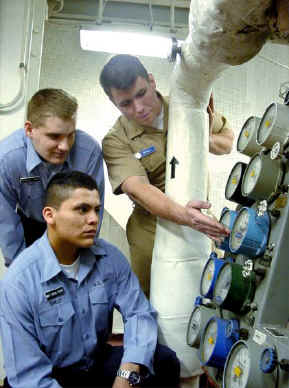One of the best investments the US Navy can make is
in unmarried sailors living aboard ship. Its fair to say that sailors assigned to ships work two to three times more hours each year than other servicemen.
Most all Navy ships make routine six-month deployments where they are usually on
duty 24-hours a day. Even
during their year "at home" between deployments, ships spend four months at sea preparing
for deployment. This prevents sailors from taking college classes or working
part-time at night. Many other servicemen deploy overseas, but their hours and living conditions are far, far better than life aboard
ship.
Civilians may confuse Navy deployments with their Caribbean
vacation cruises. Navy ships have no alcohol, live entertainment, legal gambling, or swimming pools.
A small two-person cruise cabin would typically house nine
junior sailors. Everything they own must be crammed into the room. In
recent years, terrorist concerns have severely restricted port calls around the
world making Navy life tougher.  When ships return from deployments, the Navy does not provide quarters ashore for unmarried sailors below
E-6, so they continue to live crammed aboard ship.
Since they are always on ship, they are often rounded up for special
details
while their married counterparts sleep soundly at home.
When ships return from deployments, the Navy does not provide quarters ashore for unmarried sailors below
E-6, so they continue to live crammed aboard ship.
Since they are always on ship, they are often rounded up for special
details
while their married counterparts sleep soundly at home.
Sailors aboard ship below E-4 have the worst quarters of anyone in the US military, yet they are eligible for just $50 a month in sea pay, while some senior submarine officers rate up to $595. Officers and Chiefs receive the most sea pay, even though they rate much better quarters aboard ship and quarters ashore. These inequities cause most unmarried sailors to either marry or leave the service. Imagine how an E-5 with three years service feels about the new married E-2s on his ship who graduated from high school a few months ago and live in Navy paid apartments while he remains confined to his bunk.
As a result, thousands of teenage sailors decide to get married each year just because they want to live off ship. A Navy study a few years back revealed that young sailors are 30% more likely to be married than civilians their age. These premature marriages often become financial and legal nightmares which destroy morale, especially when the teenage father is gone for months at a time. It is also common for sailors to get a courthouse marriage without telling their families in order to share an apartment with their girlfriend, or even split the Basic Housing Allowance (BAH) with an older female "friend". Another perverse result is that single women on ship who become pregnant, and even single men who impregnate civilians, are rewarded with a monthly BAH bonus when the unwanted baby arrives.
The solution is to pay a BAH to any servicemen without government quarters; a ship bunk will no longer be considered adequate quarters. While the other services offer private apartments to junior enlisted, the Navy considers several sailors crammed into bunk beds in a single room with no bathroom or window to be adequate quarters. A bunk and locker aboard a ship is not adequate quarters. All servicemen deserve quarters ashore or BAH. Sailors on ship can use that money for an apartment ashore, however, most unmarried sailors will be happy to pocket the money and just use it for hotel rooms a few nights a month. This will compensate them for difficult shipboard duty which requires twice as many work hours as most other servicemen.
This may seem expensive, but the Navy will eventually break even. Recruiting will improve as recruiters sell the idea that difficult shipboard service is financially rewarding because unmarried sailors can pocket their monthly BAH. The Navy will not have to offer large bonuses to reenlist most sailors. All young sailors would seek ship duty, rather than the constant administrative maneuvering to get stationed ashore. Moreover, getting married will cost young sailors money since they will have to use their BAH for an apartment, or forfeit it for government quarters ashore. As a result, the number of young married sailors will quickly decline as they decide to wait a few years until they earn more money before attempting to raise a family. The bonus for becoming a "single parent" will also disappear. All this will save the Navy millions of dollars each year from family health care and other services. Morale will soar, desertions will decline, reenlistments will rise, and combat readiness will increase.
Carlton Meyer editorG2mil@Gmail.com
©2002 www.G2mil.com